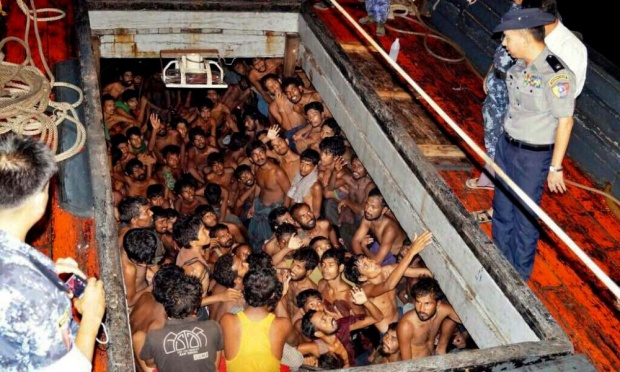Posts Tagged ‘Human Trafficking’ (68 found)
Fate of the Rohingya Remains Uncertain
 The UN High Commissioner for Refugees has stated there are still thousands of Rohingya and Bangladeshi refugees stranded at sea, half of whom have been confined to their boats for more than a month. Many of the refugees are facing severe food and water shortages, and rescuers from Malaysia, Thailand and Indonesia – including Sumatran fishermen who have taken it upon themselves to rescue refugees – have reported that a number of boat people are in grave condition. Meanwhile, on 24 May 2015, another mass grave containing hundreds of refugees was unearthed near one of the recently uncovered human trafficking camps in Malaysia. A number of the victims were found to be from Burma, demonstrating the desperation faced by thousands of refugees wishing to emigrate from the oppression faced back home.
The UN High Commissioner for Refugees has stated there are still thousands of Rohingya and Bangladeshi refugees stranded at sea, half of whom have been confined to their boats for more than a month. Many of the refugees are facing severe food and water shortages, and rescuers from Malaysia, Thailand and Indonesia – including Sumatran fishermen who have taken it upon themselves to rescue refugees – have reported that a number of boat people are in grave condition. Meanwhile, on 24 May 2015, another mass grave containing hundreds of refugees was unearthed near one of the recently uncovered human trafficking camps in Malaysia. A number of the victims were found to be from Burma, demonstrating the desperation faced by thousands of refugees wishing to emigrate from the oppression faced back home.
Burma’s discriminatory treatment of the Rohingya continues to fuel the refugee crisis in the Andaman Sea. Over the past weekend, President Thein Sein approved the Population Control Health Care Bill, which enshrines into law the authority for state governments to determine birth-spacing guidelines in regions that are deemed to be facing high population growth, thus potentially acting as a tool for religious and ethnic discrimination. This repressive and discriminatory bill, a component of the controversial Race & Religion Protec tion Laws, has been supported by an influential group of ultra-nationalist Buddhist monks, such as the notorious Wirathu. The group has long spearheaded the hate campaign against Burmese Muslims of which many analysts claim is politically motivated by elements within the state apparatus.
• • •Urgent APRRN Statement On Indonesia, Malaysia and Thailand Allowing Migrants Rescued at Sea Temporary Protection
APRRN welcomes the decision of the governments of Malaysia, Indonesia and Thailand to provide temporary protection to refugees and migrants rescued at sea as a step in the right direction […]
• • •ASEAN Parliamentarians Welcome Temporary Shelter for Boat People, but Stress Need to Address Root Causes of Refugee Crisis
JAKARTA, 21 May 2015 – ASEAN Parliamentarians for Human Rights today welcomed the decision by Indonesia and Malaysia to provide temporary shelter to 7,000 migrants stranded at sea, but continued to demand that regional leaders address the state-sponsored persecution of Rohingya in Myanmar that lies at the root of the mass exodus […]
• • •Letter from Members of the U.S. House of Representatives to U.S. Secretary of State John Kerry on the Rohingya Refugees
Like many around the world, we are horrified by the humanitarian crisis affecting the Rohingya Muslims in Southeast Asia, where thousands of men, women, and children have been put at grave risk as they flee systematic repression in Burma […]
• • •South East Asia: Necessary U-Turn on Refugee Boats Still Leaves Thousands at Risk
The decision by Indonesia, Malaysia and Thailand to reverse an appalling policy of turning back boats carrying refugees and vulnerable migrants is a step in the right direction – but falls far short of the measures urgently needed to save thousands of lives still at risk at sea, or to address the root causes of the crisis, Amnesty International said […]
• • •Southeast Asia: End Rohingya Boat Pushbacks
(Bangkok, May 14, 2015) – Thailand, Malaysia, and Indonesia should end their pushbacks of boats with Rohingya and Bangladeshi migrants and asylum seekers, and instead bring them ashore and provide desperately needed aid, Human Rights Watch said today […]
• • •ASEAN Parliamentarians: Horrific Discoveries In Southern Thailand Further Demonstrate The Need For Regional Action
JAKARTA, 8 May 2015 — The horrific discovery of dozens of bodies of trafficking victims in southern Thailand represents yet another disturbing outcome of a collective lack of leadership on the part of regional governments to address the pervasive problem of human trafficking and the unfolding tragedy for Rohingya Muslims, said ASEAN Parliamentarians for Human Rights (APHR) this week […]
• • •Thailand: Mass Graves of Rohingya Found in Trafficking Camp
(New York) – The discovery of more than 30 bodies in a human trafficking camp should prompt Thai authorities to authorize an independent, United Nations-assisted investigation, commit to publish its findings, and bring those responsible to justice, including any government officials involved, Human Rights Watch said today […]
• • •Testimony to the House Committee on Foreign Affairs Subcommittee on Africa, Global Health, Global Human Rights, and International Organizations “Accountability and Transformation: Tier Rankings in the Fight against Human Trafficking”
Thank you, Chairman Smith, and other distinguished members of the Subcommittee for inviting me to testify at this important hearing on the U.S. State Department Trafficking in Persons (TIP) report and the tier-ranking process […]
• • •United States: Assign Tier-3 Rankings to Myanmar, Thailand, Malaysia, Bangladesh in Annual Trafficking Report
(WASHINGTON, DC—April 22, 2015) The State Department should assign Myanmar, Thailand, Malaysia, and Bangladesh a tier-three ranking in its forthcoming Trafficking in Persons (TIP) report in order to encourage more robust and effective action to combat human trafficking, Fortify Rights said today […]
• • •








 All posts
All posts